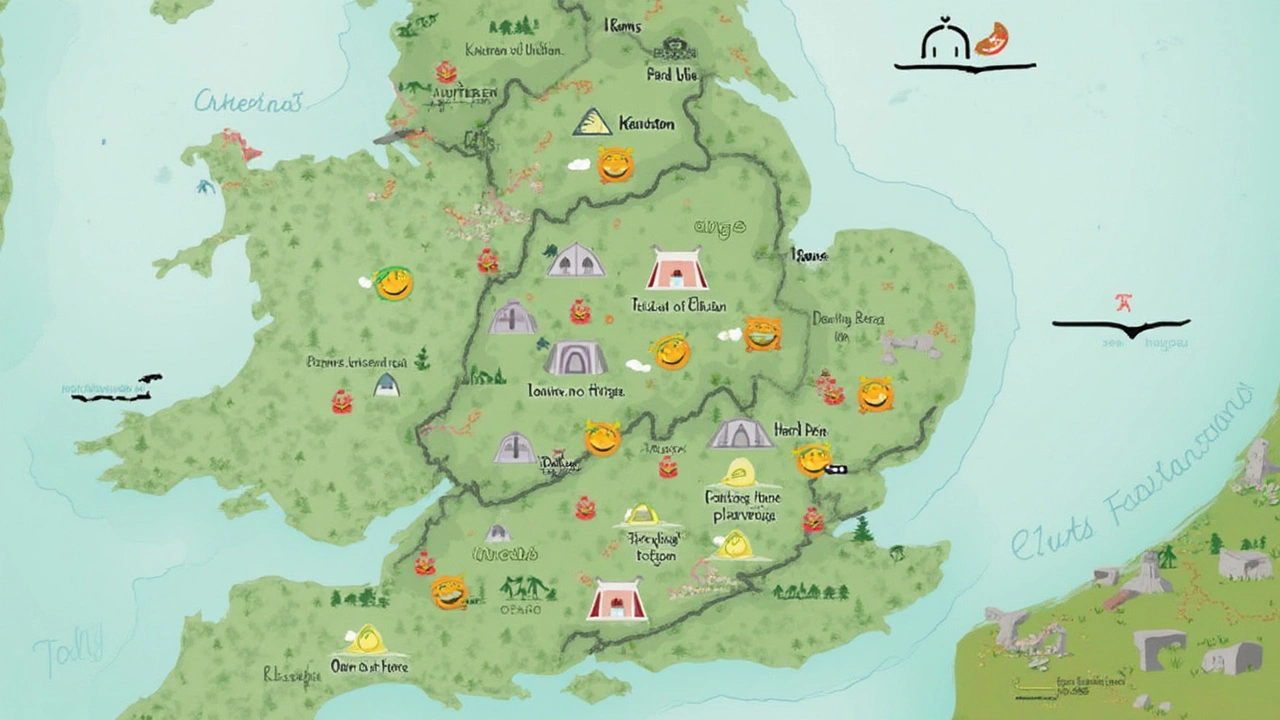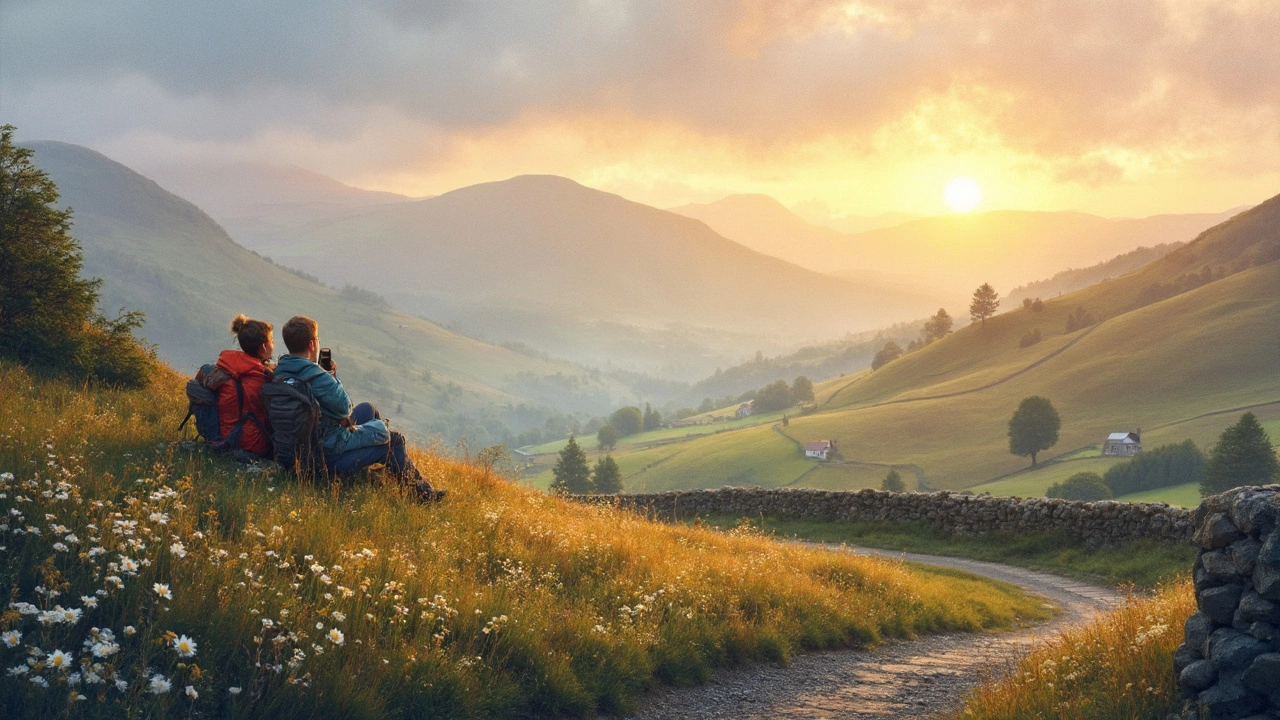Getting away from the noise and pitching up in a quiet spot—sounds perfect, right? Before you toss your tent in the boot and drive off, you should know the UK has some strict rules about camping for free. Most land here is privately owned, and just dropping your tent anywhere could land you with a grumpy landowner or even a fine. So, where can you actually camp for free without worrying?
England and Wales are the trickiest. Wild camping’s only truly legal on Dartmoor, and even there, things have got complicated in the past couple of years. Most other wild spots? Technically, you need permission, even if people do it anyway. Scotland's a whole different world, though. Thanks to the Land Reform Act, you're allowed to camp on most unenclosed land, as long as you do it responsibly. That means respecting both nature and locals; no rowdy parties or litter left behind.
- What the Law Says About Free Camping
- Wild Camping Hotspots in the UK
- Essential Tips for Legal Free Camping
- Staying Out of Trouble: Common Pitfalls and How to Avoid Them
What the Law Says About Free Camping
If you’ve wondered about the rules for free camping UK, you’re not alone. Here’s the deal: in most of England, Wales, and Northern Ireland, wild camping is usually illegal unless you have the landowner’s okay. There’s no “right to roam” when it comes to popping up your tent just anywhere. That means you could be asked to leave or even risk a fine if you don’t have permission. It might sound strict, but the law is there partly to protect landowners and the countryside.
The only true exception is Scotland. The Scottish Outdoor Access Code, thanks to the Land Reform (Scotland) Act 2003, gives people the right to camp on most unenclosed land, like the Highlands or along many lochs. The catch? You have to be responsible—leave no trace, don’t set up too close to buildings, and don’t block roads or paths. Camping near schools, private homes, or busy roads is a big no. Let’s put it in a table for a quick look:
| Region | Is Wild Camping Legal? | Key Rules |
|---|---|---|
| Scotland | Yes (with guidelines) | Follow Access Code, stay off enclosed/private land |
| England & Wales | No (except Dartmoor) | Landowner permission needed |
| Northern Ireland | No | Landowner permission needed |
| Dartmoor (England) | Limited | Some designated areas, check current boundaries |
Dartmoor, in southwest England, used to be a wild camping haven. After a legal battle in 2023, true wild camping became much more limited, but parts are still open if you follow the National Park’s maps and rules. Always double-check the latest info before heading out, since the rules keep shifting.
If you fancy camping for free in the rest of the UK, you really need that landowner’s nod—sometimes a farmer won’t mind for just one night if you ask nicely. Stay respectful. Don’t act like you own the place and people are usually cool about it.
Wild Camping Hotspots in the UK
If you’re hunting for proper wild camping UK action, let’s start up north. Scotland’s the big winner here. Thanks to the Land Reform (Scotland) Act 2003, you’re pretty much free to pitch your tent on most unenclosed land—no fee, no drama. The Scottish Highlands are like a playground for campers: think Cairngorms National Park, the Isle of Skye, and Glen Coe. These spots are famous for their raw, open landscapes, and you’ll often see solo campers (plus the odd hiker with a dog like Luna) enjoying a night under the stars. Still, avoid fenced fields, gardens, or spots crowded with livestock.
Dartmoor in Devon is about as good as it gets in England for legal free camping UK. You can camp on mapped commons in Dartmoor National Park, but you have to follow the sparse rules—no groups, no crowds, and stick to short stays. They even provide an official map so you know where it’s legal. In 2023, some of these rights nearly vanished after a legal battle with a local landowner, but public pressure helped win them back, with some tweaks. Double-check maps before you go, as boundaries sometimes change.
Looking elsewhere, most of England and Wales is a no-go for wild camping without the landowner’s permission, but there are often "tolerated" spots in places like the Lake District, the Brecon Beacons, and Snowdonia. Park authorities sometimes turn a blind eye to discreet campers who arrive late, leave early, and clean up behind themselves. Pitch up high and away from main paths or roads, and keep numbers small. These aren’t official legal camping UK sites, so you’re technically trespassing, but with respect and stealth, many folks get away with it.
- Scotland: Most unenclosed land, especially Highlands, Cairngorms, Isle of Skye, Glen Coe.
- Dartmoor: Certain mapped commons within the National Park. Check the official online map.
- Lake District, Brecon Beacons, Snowdonia: Wild camping tolerated in remote, upland areas—always ask if you're close to farms or homes.
For a quick overview, here’s how the UK stacks up for wild camping:
| Country/Area | Legal for Wild Camping? | Best Known Spot |
|---|---|---|
| Scotland | Yes | Cairngorms National Park |
| England | Dartmoor only (with restrictions) | Dartmoor National Park |
| Wales | No, but sometimes tolerated | Snowdonia |
| Northern Ireland | No | Sperrin Mountains (with permission) |
If you want actual peace of mind and zero risk, Scotland is the obvious choice for camping for free UK. Just remember: every place has its own vibe and hidden rules, so always double-check before you head out—especially if you’re bringing your pup like Luna along for the ride.

Essential Tips for Legal Free Camping
If you want to enjoy free camping UK adventures without hassle, you need more than just a good tent. There are clear rules and some local quirks you should know about before bedding down anywhere on the map.
- Always ask permission in England and Wales. With most land privately owned, just a quick knock on a farmhouse door or a polite phone call can save you a ton of bother later. A surprising number of landowners are friendly if you ask up front and promise to respect their place.
- Stick to 'Leave No Trace' rules everywhere. That means pack out every bit of rubbish, pick up after your dog (yes, Luna’s bags always go with me), and avoid campfires unless you're totally sure they're allowed. On open moorland, embers can turn into wildfires fast.
- Keep your group tiny. Pitching up solo or with just one friend keeps your impact small and won't attract the wrong kind of attention. Large groups can get you moved on quickly, especially in busy areas.
- Pitches that are out of sight and off main trails are best. You're less likely to bother anyone (or be bothered yourself). Even on wild camping UK trips, discretion matters.
Scotland stands apart, but those same habits apply. The Scottish Outdoor Access Code breaks it down—camp away from roads, buildings, and fields of crops or animals. Usually, you shouldn't stay more than three nights in the same place. Here’s a handy table showing how the rules stack up across the UK:
| Nation | Legal for Free Camping? | Key Rule |
|---|---|---|
| England | No (except parts of Dartmoor) | Get landowner permission |
| Wales | No | Ask before camping |
| Scotland | Yes* | Follow the Outdoor Access Code |
| Northern Ireland | No | Ask before camping |
*There are exclusions—like military land, golf courses, and school grounds, so double check any spot if you’re not sure.
Finally, if you’re camping anywhere free, keep it low-key—minimal gear, no noise, done by sunrise. That mindset keeps wild spaces open for everyone and dodges drama. Those are the golden rules for legal camping UK style.
Staying Out of Trouble: Common Pitfalls and How to Avoid Them
Free camping sounds like a dream until someone knocks on your tent early in the morning, asking why you’re there. To avoid that, it pays to know the usual traps folks fall into and how to dodge them. The biggest problem is pitching up without checking the land’s status—most of the UK is private property. Unless you’re certain it’s legal, you risk trespassing, which can mean being asked to leave or even dealing with the police. In really rare cases, you could end up with a fine.
Another classic mistake: leaving rubbish or making noise. If you’re on someone’s land, nothing gets you kicked out faster. People have pushed for tighter rules in places like Dartmoor because of careless campers. With free camping UK sites, the general rule is to leave no trace. Take every bit of rubbish with you and keep noise down, especially after dark.
Campfires? Forget about them unless there are clear signs it’s OK. Open flames have caused wildfires in Scotland, and because of that, many landowners are on edge. The weather might seem calm, but even a small spark can spread quickly in dry grass. Instead, bring a camping stove for cooking and keep it away from flammable stuff.
It’s also easy to miss the mark with toilets. Digging a shallow hole’s the old advice, but that only works if you’re far from water and trails. Some busy wild spots now ban it altogether, so always check local rules before heading out. And for places where wild camping is technically allowed, like parts of Scotland, group sizes matter. Stick to groups of two or three tents to avoid being moved on.
- Always check a detailed map for public vs. private land.
- Get landowner permission in England and Wales unless you’re on Dartmoor or another official wild camping UK area.
- Keep a low profile: no big groups, no huge tents, and blend in with your surroundings.
- Pack out everything—even toilet paper and food scraps.
- Don’t set up camp near homes, barns, or blocked paths; people notice fast.
Just to put it in perspective, nearly 75% of the UK is privately owned, so the odds are stacked against random pitching. Respecting local rules and using common sense keeps things friendly and makes sure others can enjoy camping rules UK spots in the future, too. You’ll find most real problems come when people ignore the basics or annoy the locals.
